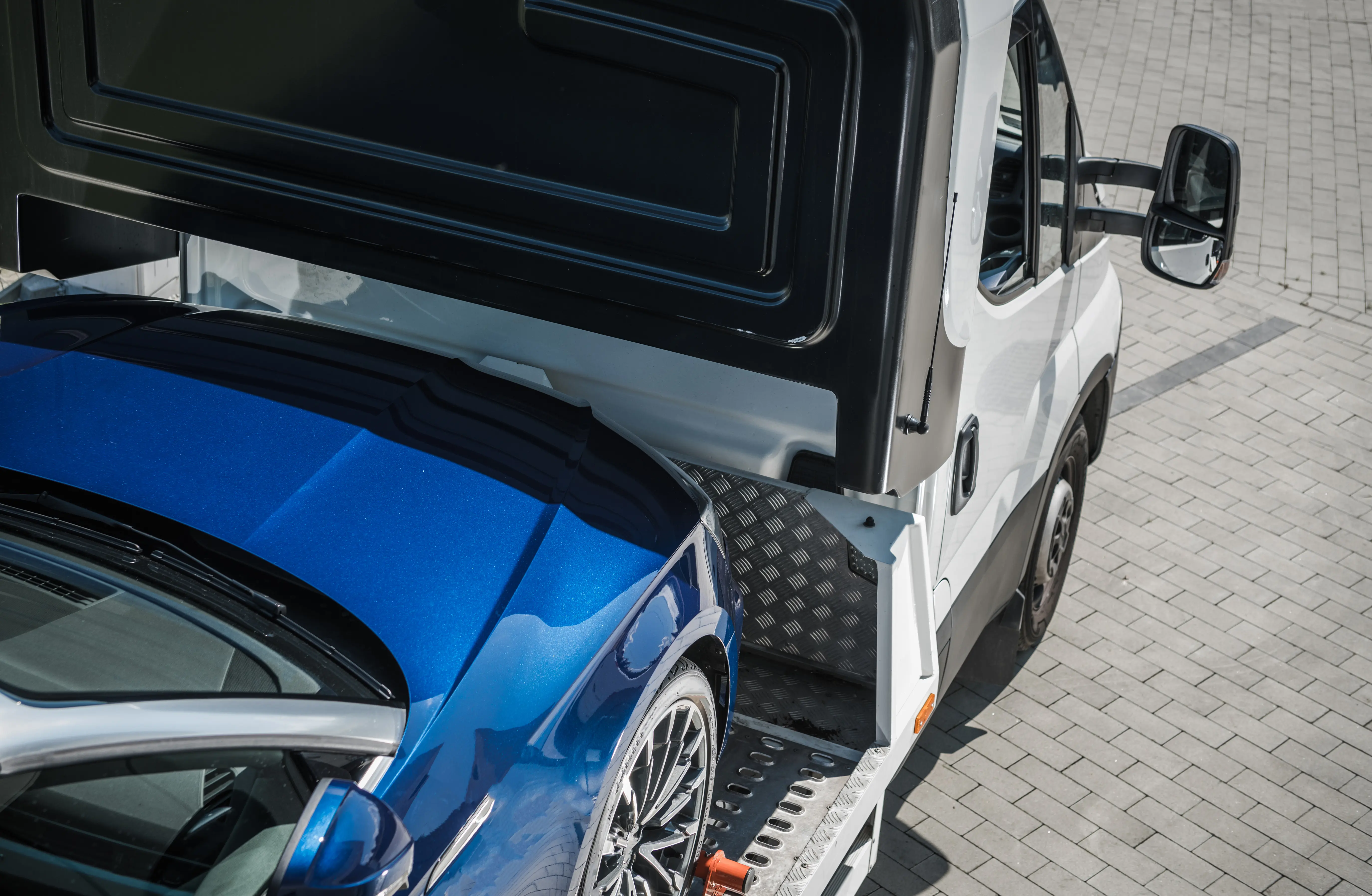California towing laws authorize police and property owners to have vehicles towed if they are illegally parked or abandoned. Getting your car back after it’s been towed often involves paying steep towing and storage fees, so it’s important to know your rights.
- A vehicle may be towed by California police if it’s illegally parked, obstructing traffic, or posing a public safety hazard.
- Private property owners must warn drivers before towing their vehicles.
- To get your vehicle after it’s been towed, you’ll need to provide necessary documentation and pay any applicable fees.
- California towing laws can be complicated depending on the situation at hand, but knowing your rights can help you avoid predatory practices.
When can police tow a vehicle in California?
California Vehicle Code Section 22651 deals with situations when local police are authorized to tow a vehicle.
As per Section 22651 of the CVC, here are the main cases when California police may tow your vehicle:
- If the vehicle is left unattended in a tunnel or on a bridge, viaduct, or causeway
- If the vehicle is left unattended on a highway such that it poses an obstruction or hazard to traffic
- If the vehicle has been reported as stolen
- If the vehicle is illegally parked and blocking a private driveway or fire hydrant
- If the vehicle has been left for four or more hours on the right-of-way of a freeway
- If the driver of the vehicle is incapacitated by illness or injury and cannot move the vehicle
- If a vehicle found parked on a highway or public land has five or more unpaid parking tickets or five or more notices of failure to pay or appear for other traffic infractions
- If the vehicle is parked in violation of street cleaning notices
- If the driver is arrested while operating the vehicle
- If the vehicle has no registration or license plates or the driver has no license
This isn’t an exhaustive list, so be sure to read the full text of the law if you want more information. But the short version is this: if your vehicle is illegally parked, obstructing traffic, or posing a hazard to others, the police can tow it.
Keep in mind: If police tow your vehicle, it will be taken to an impound lot.
How to get your car out of an impound lot in California
If your vehicle is towed to an impound lot, it’s important to get it out within 30 calendar days. After that, it goes to auction and you won’t be able to recover it at all.
If you are the legal owner of the vehicle, you should be able to get it back during normal business hours. Be sure to bring:
- Your driver’s license
- Proof of current registration
- Proof of insurance
- Cash or a credit card for payment of fees
If you’re not the legal owner of the vehicle, or if you can’t get to the lot yourself, someone other than the registered owner can claim the vehicle with the same documents and written authorization from the owner.
In terms of fees, the exact amount you’ll have to pay varies depending on the circumstances, but be prepared for a charge in the hundreds or even thousands. That includes:
- Towing charges
- Daily storage charges
- Administrative fees
- Transfer charge fees
- After-hours gate fees, lien charges, and auction fees (when applicable)
ContentPolice can’t afford to hold your car indefinitely, so act fast. Call the impound lot as soon as possible after the vehicle is towed and ask for instructions.
When can private property owners tow a vehicle in California?
California private property towing laws, contained in Section 22658 of the Vehicle Code, set out specific rules for property owners that limit the circumstances under which they can call a tow truck to remove a vehicle.
One of the most important requirements is that they notify the vehicle owner before towing their vehicle. That can take a few different forms, such as:
- “NO PARKING” signs: The signs must be in plain view, at least 17 inches by 22 inches, and posted in plain view at all entrances. The signs must also include the name and number of the towing company that the property owner has an agreement with, along with the number for the local traffic law enforcement agency.
- Notice of parking violation: If the vehicle has been issued a violation notice, the property owner can tow the vehicle after 96 hours.
- Inoperable vehicles: If the vehicle is missing an engine, a transmission, wheels, tires, a windshield, or anything that would make it impossible (or illegal) to operate on a public road, the property owner can tow the vehicle if they first notify local law enforcement and wait 24 hours.
If your vehicle is towed by a property owner who fails to comply with any of these requirements, they’re legally responsible for double the towing and storage fees for the vehicle.
Here are a few other regulations associated with private property owners towing vehicles from their property:
- The property owner must have the vehicle towed to a storage facility within a 10-mile radius of the car’s original location.
- The storage facility must be open during normal business hours (i.e. Monday through Friday, 8 am to 5 pm) and able to release the vehicle outside of those hours.
- After towing a vehicle, property owners are legally required to notify law enforcement within one hour.
- If the legal owner of the vehicle wants to know why their car was towed, the property owner must state the grounds for removal.
When can your car be towed from a parking lot in California?
Under Section 22953 of the Vehicle Code, a vehicle may be immediately towed from a private parking lot (including retail or restaurant parking lots) if:
- The vehicle is blocking an entrance or exit
- The vehicle is parked in a fire lane or in a disabled parking space without a permit
- The vehicle is within 15 feet of a fire hydrant
- The vehicle is on residential property
- The vehicle is parked in a motel or hotel parking lot in a space designated for a specific room
If you’re not in violation of any of those conditions, you should be safe to park for at least an hour—but after one hour, your right to park has elapsed and the property owner is authorized to tow away your vehicle.
What are my rights if my car is towed in California?
If your car is towed for any reason in California, remember that you have certain rights. These include:
- Reason: The right to know the grounds on which the vehicle was towed
- Personal property recovery: The right to retrieve your personal property from the vehicle, even if you aren’t able to pay for the vehicle itself to be released
- Legal action: The right to sue the towing company if the vehicle was damaged during removal
- Notice: The right to notice before your vehicle is towed from private property
If your vehicle has been towed, call the local traffic enforcement agency right away for more detail and instructions. For example, the San Francisco Police Department maintains a webpage with resources for drivers whose vehicles have been towed.
Violation of California’s towing laws is a civil misdemeanor, and you may be able to recover some of your costs if you can prove that your vehicle was towed illegally.
FAQ
-
What is the maximum towing fee in California?
-
Can a landlord tow your car without notice in California?
-
Can vehicles get impounded at DUI checkpoints?
-
Can my car get towed without notice?
-
How long can a vehicle remain impounded?
-
How long does a car have to be parked before it is towed?
-
Can you tow someone’s car if it’s parked in front of your house?
-
How do I file towing company complaint?
-
Can apartment complexes tow your car?
-
How long before a restaurant tows an illegally parked car?

Jaya Anandjit is an insurance writer specializing in car insurance, car maintenance, and personal finance. Jaya’s mission is to create and optimize content that helps car owners save time and money. To this end, Jaya has written over 100 articles that help drivers with everything from choosing the best insurance coverage to troubleshooting common car problems. Jaya has also written thoughtful reviews that help car buyers make informed vehicle purchases. Prior to joining Jerry’s editorial team, Jaya worked as a digital marketing manager for clients including Clothing Room MTL and The ResourceHub.

-
Licensed Insurance Agent
R.E. Fulton is an expert insurance writer specializing in car ownership topics from car shopping and loan advice to insurance and repair guides. R.E.’s mission is to create unique and accessible content that helps readers to become more successful and independent car owners. R.E. has written and edited over 900 high-performing articles for Jerry, with an average of 1 million+ views. As a senior writer on Jerry’s editorial team, R.E. draws on over 10 years of experience as a professional writer and digital publishing specialist. Prior to joining Jerry’s editorial team in 2021, R.E. worked as a writing coach at Columbia University, the Rochester Institute of Technology (RIT), and the University of Rochester. They serve as a managing editor for peer-reviewed history publication Nursing Clio, where their work has appeared regularly since 2015.








